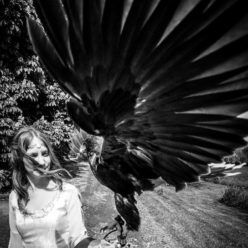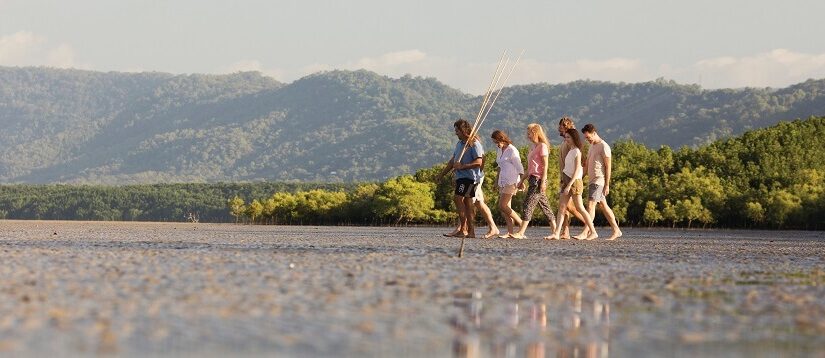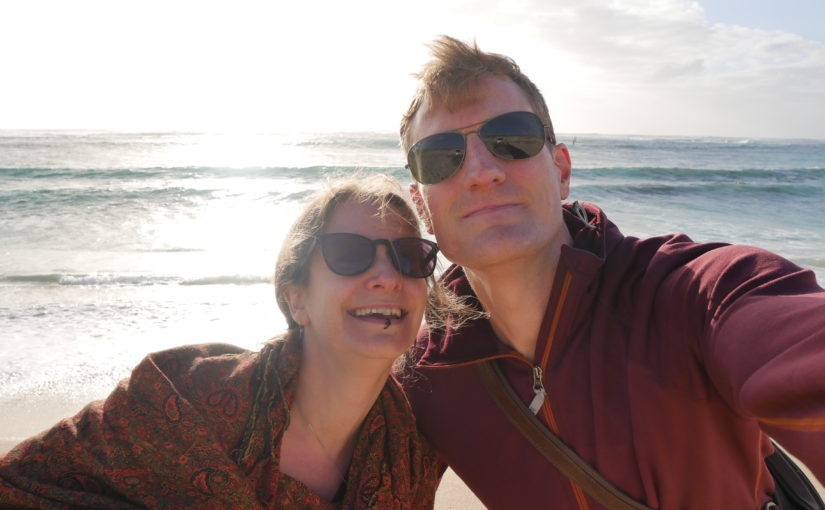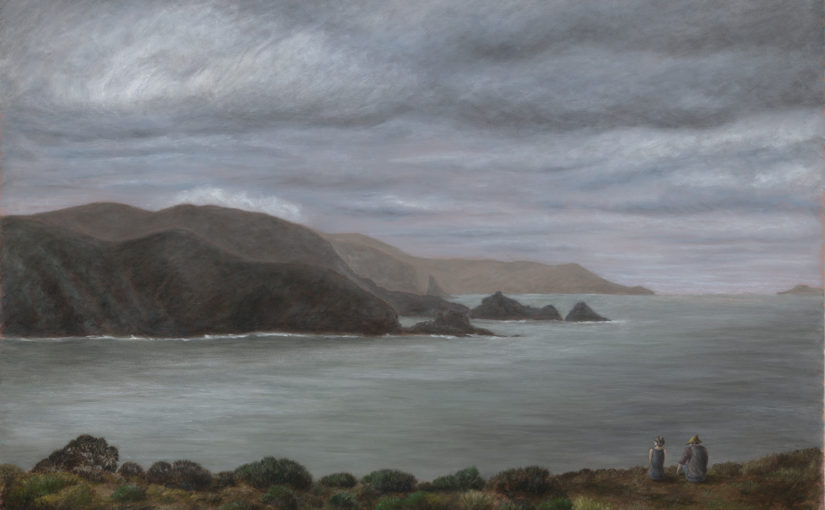One hideously early morning in July we left our fair
territory to explore Tasmania. I had been looking forward to it. To my
Australian friends (and several of my English ones over the phone), I’ve been
moaning a lot about the Australian winter. Fie, woman! I hear you say! Winter
days drenched in glorious sunshine, frequently topping 15 degrees? Even the
Australian Bureau of Meteorology (ubiquitously ‘BOM’ on everyone’s phone, which
sounds less authoritative) recommends UV protection for an hour a day in the middle
of winter. So what the feck is my problem? And what has that got to do with
Tasmania?
We’ve all heard of the phenomenon ‘hygge’ that Ikea’s made a
whole bloody industry out of (stick this post into a word doc – you’ll see the
Danish word is so much an accepted commercial part of our language it doesn’t
even come up as a spelling mistake). The Dutch have a word for it too; ‘gezellig,’
(now Microsoft doesn’t like that one) and these words evoke a very specific
kind of notion to their native speakers of blankets, fires, hot chocolate, books,
safety, friendship, and smiles. And before the British lament their anaemically
deficient vocabulary, the English language has a word for it too: cosy.
I’ve always been fascinated untranslateables, ever since I
travelled Europe, and my aunt bought a book about them called ‘In Other Words…’
(which I can’t find; which one of you bastards has it…). I can identify no
Italian word that conveys the ‘cosy’ sentiment. But I bet in the rough and
aggressive half French sounds of the Piedmontese dialect just south of the Alps,
they got a word for it. Any country that habitually buries itself under winter’s
grey blanket for a solid sixth months has this need for coziness. It contrasts
necessarily to the misery of winter; you need first to battle through rain driven
horizontal by 50k/h winds to reach a place of safety where you will curl with
relief into a large chair, huddle a blanket over you, drink tea, read books,
encourage anyone foolish enough to get up to light some candles and bring more
tea, and be happy. The sort of thing where if a beam of sunlight peeps into the
red-bathed warmth, you almost regret it. Go away, you think, you’re
interrupting the cosy.
People who have winter in their souls wallow in it. It’s the
best thing about winter. Admittedly, there are the virtuous days where silver morning
frost trembles under a weak yellow sun and you tramp through the forest and see
deer capering in the shadows. But then you deem yourself sufficiently exercised
and thankfully head home, fully justified to sit about on your arse for the
rest of the week. Winter is rest. You can’t be out and about doing things all
the time, you hibernate, you don’t feel like exploring and adventuring, and you
stay cozy and sit it out, spending more time with friends over pub lunches by
roaring fires and congratulate yourself for having achieved even that. And of
course, in the middle of it all, piercing the misery, are the winter
celebrations (Christmas), where boaters give each other a log from their own
store on Christmas Eve, people get together to eat and drink, you’re justified
starting on the old bucks fizz at 10am, beautiful decorations cheer us up and
we are cosy together while the wind shouts outside.
So how does this all work for a nation that mostly isn’t
troubled by winter and even those few states that are don’t have the month-long
celebration to welcome them in from the hungry teeth of frost?
Well, they mostly just screw their eyes up tight and wait
for it to be over.
So I was looking forward to truly wallowing in winter in ‘deepest
darkest Tassie’ as it has been described to me. I was going to dance Morris at
the Huon Valley Midwinter Festival and I was going to drink and be merry.
So it rained a lot. That’s ok, gives you an excuse to retire
to the pub. But the only time one transfers from cosy to bleak is when you can’t
actually get out of the rain, as was rather the case here, which is not what I
meant about wallowing in winter at all. The accumulated sides practised the
processional dance on a dangerously slight incline behind the shed where we
stashed all our stuff at the festival, and several of us took a tumble.
Throughout the weekend, there was much falling over in the mud for Morris dancers
but all the jigging about does keep you warm.
The festival was really beautiful. Willie Smith’s Cider
began four generations ago in the Huon Valley in Tasmania by Willie Smith (whose
parents had arrived here at the expense of her Majesty) when he planted the
first tree in 1888. Back then, the Huon Valley exported apples all over the empire
and was known as The Apple Isle (did you know that? I didn’t know that), and
they got creative when markets changed (that’s free trade) and went to making
organic cider. Our friends told us something about Granny Smith of this family
being the woman who grew the titular apple…we could find no evidence of this on
google, but the cider was delicious. I’m not a huge cider drinker, but I loved
every drop. The Huon Valley itself is beautiful; sweeping tall hills, forests,
mountains and eye achingly green; and the festival site was the best place to
enjoy it. Morris dancers, and Morris groupies (!) were provided FREE
accommodation for the duration of the festival in a nice little hotel, free
buses took us to the grounds and back, and we got magical red wrist bands that
meant you could drink as MUCH CIDER AS YOU WANT FOR FREE. This was a staggering
boon, and, I hoped, sufficient compensation for Yates enduring a whole weekend
of Morris. There were about four tented stages, a feasting tent with splendid
food options from curry to fish, cosy little bars and it was all brilliantly
decorated. Apples were the main adornment, and I shudder for the people who
must have contracted apple-based fatigue from threading hundreds of apples onto
single wires that were then hung as beautiful baubles absolutely everywhere.
There were little fires around and a dirty great bonfire in the middle. It did
rain and it was cold, and there was little getting out of it, but it did not dampen
my revels as I capered and fucked up dance after dance (never mind – it’s only
Cotswolds), glugged cider and swanned around in an apple haze. The wassailing
ceremony is apparently the biggest in the world, and all 50 or so of us
processed to the apple trees (4 sort of separated ceremonial little ones at the
top of a slope, almost like a stage) carrying torches or eucalyptus branches and
sang and shouted to welcome the spirits and scare away evil and I loved every
minute of it.
Yates’ experience was, er, somewhat different. He spent much
of the day shivering over a book, waiting for bands to start (there were
awkwardly long gaps between acts and he even caught himself saying ‘thank
goodness for the Morris really…) and the free booze didn’t warm him up as much
as the dancing did me. Still. We watched a great act – Ruben Reeves, check him
out – and he did a public duty of warming up 100 people in the middle of winter
by getting them to do first a circle pit, then a dance off, and we rocked the
hell out until the tent was filled with people stripped to their waists with
the little pile of jumpers and coats that we all remember from our club days
piled up in front of the stage. Awesome.
After the joys of the festival, we packed our mud sodden
bells and hankies away and looked forward to a few days of holiday to really
soak up the cosy. Away from tents, and closer to solid buildings that serve beverages.
I had this conviction that the place we had booked on Bruny Island (beautiful
place off the coast just south east of Hobart) had a log burner and I was
excited to cuddle up by it. I do miss my old log burner on the boat. We went to
Bonorong wildlife sanctuary, laughed at kookaburras, cuddled Kangaroos and
stroked wombats and koala bears. Total win. Then we sped off to the Island of
Bruny!
It seemed odd to me that after getting off the mainland to explore
a small island, we then left that island to explore another, yet smaller island.
I had a sort of Russian doll effect – like how many small islands do I have to visit
before I find the final one? Anyway, this place is foodie heaven. They got an
oyster place called ‘Get Shucked’ (or as I kept calling it in my infinite
coolness, ‘what the shuck?’), they got a place really dedicated to whey….and
make beer and cheese, they got a honey place, they got vineyards. I was excited.
See previous post for my Australian food adventures which had eventually led me
to this heady place.
Yates wasn’t as excited as me about oysters (I again refer
you to his wry comments on the matter of molluscs recorded in the previous
post), certainly not a whole dozen of them, but one set of the 12 was lightly battered
and deep fried and what the hell’s not to like about that? I slurped down a couple
with great delight, then seized another that was cooked with a little chorizo
and a wonderful broth which I slung down my neck – imagine my horror when I
discovered it was bloody hot, of course, wasn’t it. The plain, raw ones with
lemon were me fav though. Then we hopped back in the car and wheel spun out of
there down the (only) road about a k or 2 and got to the beer place where we
tasted a cheese so marvellously soft it was making a run for the door, and I generously
had a beer flight of 4 so driver Yates could enjoy a sip of each while I tidied
the rest. I am all selfless kindness! Then we drove on to the southern half of
the island which is separated from the north by a long thin and typically
Australian named ‘neck.’ This was epic – sea on both sides of you, Tasmania to
the north west and Fuck All till Antartica to the south east. Apparently there is
a fairy penguin rookery on said neck as well (this in fact, is not true, they
don’t exist) and we sat on a viewing platform as the sun set and we watched the
moon rise silvery gold and full over the waves and gild them in glowing pearls
and it was beautiful beautiful and I wept and we sat there for an hour and not one
fucking penguin did we see. Please see above well researched fact in parenthesis.
So stiff and cold with icy bums and dead legs, we tottered back to the car and
headed for our little hotel.
Sadly, all the misguided conviction in the world won’t magic
up a woodburner if there simply isn’t one. So wallowing in cosy winter was
actually sitting in a large, soulless, breeze block draughty bar with a fire
that was going out being scowled at by the two staff on duty until we got the
hint and pissed off. We did not write them a good review.
But Bruny Island is ubiquitously beautiful: forested in deep
green eucalyptus, edged with glorious wild and ravaged beaches that were so
shallow, waves crashed up them for miles in white froth, and the gorgeous curve
of Adventure bay that poured rainbows off the crests of waves fringed with
foreign trees, trod by plover and fairy wrens with wallabies lurking nearby in
unspoilt beauty brought home to me more than ever that I Am On The Other Side
Of The World.
Then Yates made me get in the car and drive back to Hobart.
Hobart is not as beautiful as Bruny Island. It’s not as
beautiful as Canberra for that matter. Not a lot of trees or parks. Certainly
no cycle paths, and there is a madness of 4 lanes per narrow road. The good
gentleman described it as ‘like a shitty regional English town.’ I mean no disrespect
to our dear Hobartians. The harbour was splendid, there were lovely old
buildings and lovely old (but still draughty) pubs with fires. We spent a hell
of a long time in the Tasmania Museum and Art Gallery and I got all enraged
about Aboriginal murder and dispossession (endlessly) and then we visited the
Penitentiary museum and I got equally enraged about the depraved treatment and
enslavement of convicts. God. I’m tired of my soap box when there is so much cruelty
that continues in the world. But fucken….whipping people to death or at least until
their skin rots and maggots wriggle in their very backs and they vomit at their
own smell, and the Black Line where indigenous tribes were routinely wiped out…genocide
and cruelty is our history in this country. And we disengage and think oh well
people are all dicks and hide in the forest, but climate change is coming for
those too and they’ll all burn because of the aforementioned assessment about
people. Australians proud of their white heritage, that through immeasurable
fortitude and endurance survived the sheer miserable cruelty inflicted upon
them through the horrors of greed that turn humans into slaves must, surely must
agree that greed is the enemy, greed is cruel and never, never seek to visit
that on others and become the thing that is despised. Go in love my friends. Always
find out first what we like about each other, before you find out things you
disagree with. Because then, ah-ha, we can’t be lazy, we’re stuck, we already
like each other and are forced to take a more nuanced approach to untangling and
hearing each other’s stories.
After all that education about the misery of what one human
can do to another and reflecting that world wars never ended it either, we had
to cheer ourselves up with whiskey. Lark Distillery on the harbour front, while
not having a fire, was lavishly wood panelled and had real green chesterfields
so we curled up and drank whiskey and brooded on the evil of man until we were
drunk enough to giggle like a pair of dickheads over other things, then Pia
from Sydney’s Black Joak Morris joined us and we drank and drank and gassed
away about travelling, Italians, food, Morris bitching and whatever else we
could stuff into the evening.
The Tassie trip ended in the dreary rain and I have left out
the caprices of MONA gallery, dinners with Morris dancers, wines on Bruny and a
hundred other little things. But we’ll go back (in the summer next time) when
there will be more to tell; meanwhile I will sit with tea watching clouds
rampage across the sky over black mountain, huddle a blanket to me, and write!



